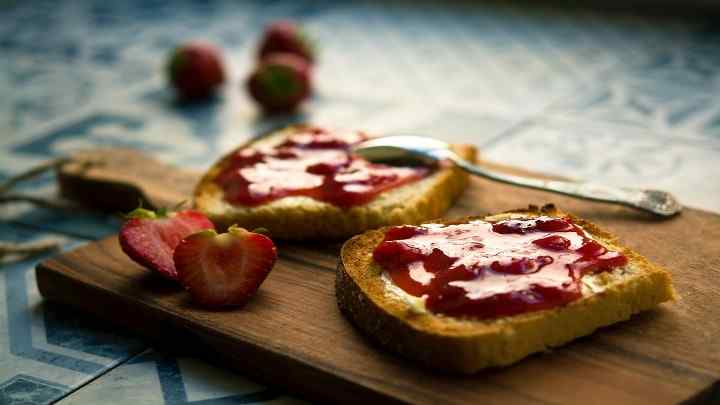No, while butter and jelly on toast is a healthy and easy breakfast option that can readily be prepared, it might not be a completely healthy one. This is because butter and jelly on toast contain a large amount of refined sugar and saturated fat.
This article examines why butter and jelly on toast might not be a healthy food for you when eaten repeatedly. It also highlights necessary substitutes that are healthier.
Butter and jelly on toast: What are the health benefits?
When taken in moderation, butter and jelly on toast can provide a range of healthy and nutritious benefits to your body. Some of these benefits include;
Good for your skin and nerve
Butter and jelly on toast provide a fair amount of vitamin E that benefits the skin. Vitamin E works as an antioxidant that combats free radicals and prevents early aging. Additionally, its nourishment is also helpful in maintaining and improving nerve health.
So, as long as you eat them in moderation, they can contribute to your overall skin health and physical performance.
Enhances your immune system
Butter and jelly on toast also contain zinc, a mineral that boosts the immune system. A portion of bread with butter and toast can supply about 12-17% of your daily intake of zinc.
Zinc enhances your immune system by boosting the process of new cell formation by proteins. It also helps improve your skin complexion.
Improve brain power
Butter on toast plays a vital role in improving brain power. Working adults and children need all the brain power they can get to excel at work or school. In this case, butter and jelly on toast might be just what you need to kickstart your day as butter contains Arachidonic Acid (AA) which is known to boost brain performance and power.
Improve endurance
Butter and jelly toast is also a great source of iron which is known to improve the body’s performance and endurance. This is because iron is crucial in blood oxygenation as well as the development and maintenance of muscles.
Therefore, a considerable daily dose of iron intake can enhance your performance during stressful activities like gym workouts or sports that require muscle endurance. Furthermore, butter contains linoleic acids that contribute to muscle building.
Maintain gastrointestinal health
Although fat is infamous for making you add weight when taken in excess, it is also quite beneficial to your health and should not always be trimmed out of your diet. The fat which you get from the butter on your toast can help form a protective lining in your gastrointestinal tract. This helps protect your digestive system from diseases or threats that may harm it.
Also, the bread used in making the toast is made with whole wheat which helps promote gastrointestinal health. This is because it contains protein and enough dietary fiber that aids proper bowel movement, colon health, and digestion.
However, be sure to choose whole-grain bread when making your butter and jelly toast, as white bread made with refined wheat flour does not contain enough dietary fiber.
SEE: Is Burnt Toast Good For Your Stomach?
What allergens are in butter and jelly on toast?
Do not eat butter and jelly on toast if you have a dairy allergy, wheat allergy, or gluten intolerance. That is because the butter comes from milk or cream and can pose a risk to you if you’re lactose intolerant while most bread used in making toast uses wheat flour. Also, check the label of the jelly you’re using to see if its flavor contains an allergen you might react to.
However, you can use healthy and dairy-free butter substitutes like coconut butter, nut butter, and avocado to avoid dairy allergies. You can also substitute regular white or whole-wheat bread by making or purchasing bread made with other gluten or wheat-free flour-like; buckwheat flour, rice flour, sorghum flour, oat flour, etc.
What are the disadvantages of eating butter and jelly on toast?
Though butter and jelly seem harmless and a great breakfast option when you’re in a hurry, it is loaded with carbs and trans fats which can be harmful when eaten excessively or repetitively.
Butter and jelly on toast is loaded with carbs because most store-bought bread contains refined sugar and flour, which leaves you with lesser dietary fiber and nutrients but more carbs. Store-bought jelly also contains a considerable amount of refined sugar. Since making your whole-grain bread and jelly can be quite a hassle, store-bought products become unavoidable.
The sugars and trans fats in the jelly and butter can cause inflammation, raise blood sugar levels, and increase the risk of heart conditions, heart diseases, and type 2 diabetes.
Are there healthier alternatives to butter and jelly on toast?
Yes, there are healthier alternatives to using butter and store-bought jelly for your bread. You can make your jelly at home using natural ingredients while avoiding the use of refined sugar. Also, be sure to purchase whole-grain bread or whole-wheat bread instead of white bread made with refined wheat flour to benefit from the nutrients and dietary fiber.
However, for the butter, you can use the following healthy butter substitutes to avoid trans fat;
Almond Butter
The proteinous nature of almond butter makes it highly beneficial and filling. It also does not contain any trans-fat but rather healthy monounsaturated fat and less saturated fat for those mindful of cholesterol.
SEE: If Almond Butter Goes Bad
Avocado
Avocados are a good source of monounsaturated fat which helps reduce bad cholesterol. It also offers vitamins, minerals, and dietary fiber. Furthermore, its creamy texture makes it a great substitute for butter and a suitable bread spread for toast.
Olive oil
Studies suggest that olive oil can help prevent metabolic disorders and cardiovascular diseases. This is because they are rich in antioxidants which combat free radicals in the body and are low in saturated fats. Its unique flavor also makes it a great butter substitute for toast.
Coconut butter
Made using coconut flesh and oil, coconut butter has been blended into a spreadable paste that will easily substitute butter. Additionally, coconut butter is rich in potassium, iron, magnesium, dietary fiber, and protein.
Nut butter
Created by roasting and blending nuts, nut butter is a great source of essential fatty acids, protein, fiber, and other minerals. It lowers your risk of cardiovascular or heart diseases due to its richness in monosaturated fats.
Nuts used in making nut butter can include almond, peanut, or cashew, and go well with toast due to their sweet and creamy texture. They serve as an excellent alternative for lactose-intolerant people. However, you should avoid nut butter if you have a nut allergy.
FAQs?
Is butter and jelly on toast vegan-friendly?
No, butter and jelly on toast are not vegan-friendly as the butter comes from milk or creams which come from a cow. Hence if you are vegan, you should avoid a butter and jelly toast diet. However, if you substitute the butter with vegan-friendly substitutes like nut butter or avocado, then it becomes safe for vegans.
SEE: If It Is Right To Refrigerate Butter: What You Must Know
Can diabetics eat butter and jelly on toast?
Yes, you can eat butter and jelly toast as a diabetic but only in moderation. Also, choose real butter rather than margarine as it contains lesser trans fat which has a better impact on your overall health and management of diabetes.
SEE: If Diabetics Can Eat Cornbread
How do you make butter and jelly on toast?
To make your delicious butter and jelly toast, simply take two bread slices, spread jelly on one slice and butter on the other slice, then combine both smeared parts to make a sandwich. Then cut it and toast it to your satisfaction. You can also first toast the bread and then apply butter and jelly to the toasted bread.
Conclusion
The bottom line is that jelly and butter on a slice of toast is a delicious combination. What’s more, it can be healthy to some extent depending on your toppings choice. To sum it all up, it is a great breakfast for those mornings when you just don’t have time to cook. It’s not going to be the most nutritious thing for you, but as a quick fix, it does the job.
Additionally, it remains one of those easy-to-make breakfast meals that go great with any beverage of your choice like coffee or any fruit juice. To enjoy the full nutritional benefits of butter and jelly on toast, make use of whole-grain bread rather than bread made with refined flour.
Finally, do you need help knowing the kind of bread you can use for your butter and jelly toast if you are sensitive to gluten? Why not give the whole-grain sourdough bread a trial? Find out more about the sourdough bread and delicious meals you can eat it with.
I hope you found this article helpful.







